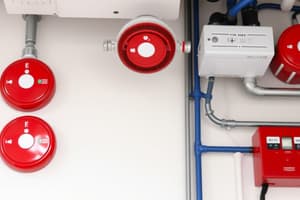Podcast
Questions and Answers
What is the primary purpose of a fire alarm system?
What is the primary purpose of a fire alarm system?
- To suppress fires
- To detect smoke only
- To monitor temperature changes
- To provide early warning of a fire, allowing for evacuation and firefighting response (correct)
Which of the following is NOT a type of initiating device?
Which of the following is NOT a type of initiating device?
- Heat detectors
- Flame detectors
- Sirens (correct)
- Smoke detectors
What is the purpose of a control panel in a fire alarm system?
What is the purpose of a control panel in a fire alarm system?
- To monitor temperature changes
- To receive signals from initiating devices and activate alarm devices (correct)
- To detect fires
- To alert people of a potential fire
According to NFPA 72, what is the minimum standby power requirement for fire alarm systems?
According to NFPA 72, what is the minimum standby power requirement for fire alarm systems?
Who should be involved in the design, installation, and maintenance of fire alarm systems?
Who should be involved in the design, installation, and maintenance of fire alarm systems?
What is the purpose of inspections in fire alarm systems?
What is the purpose of inspections in fire alarm systems?
What is the purpose of testing in fire alarm systems?
What is the purpose of testing in fire alarm systems?
What is required for all fire alarm systems according to NFPA 72?
What is required for all fire alarm systems according to NFPA 72?
Flashcards are hidden until you start studying
Study Notes
NFPA CFPS: Fire Alarm Systems
Definition and Purpose
- A fire alarm system is a combination of devices that detect and alert people of a potential fire
- The primary purpose is to provide early warning of a fire, allowing for evacuation and firefighting response
Components
- Initiating devices: Detect fire conditions and send signals to the control panel
- Smoke detectors
- Heat detectors
- Flame detectors
- Control panel: Receives signals from initiating devices and activates alarm devices
- Notification appliances: Alert occupants of a potential fire
- Bells
- Sirens
- Strobe lights
- Voice evacuation systems
System Design and Installation
- Designed to meet the needs of a specific building or occupancy
- Installed in accordance with NFPA 72: National Fire Alarm and Signaling Code
- System components must be compatible and properly interconnected
Inspection, Testing, and Maintenance
- Required to ensure system reliability and effectiveness
- Inspections: Visual examination of system components
- Testing: Operation of system components to verify functionality
- Maintenance: Repair or replacement of system components as needed
NFPA 72 Requirements
- Fire alarm systems must be installed, inspected, and tested in accordance with NFPA 72
- Systems must be designed to provide a minimum of one hour of standby power
- All systems must be monitored by a central station or remote station
CFPS Involvement
- A Certified Fire Protection Specialist (CFPS) should be involved in the design, installation, and maintenance of fire alarm systems
- CFPS ensures that systems are designed and installed in accordance with NFPA 72 and other applicable codes and standards
Fire Alarm Systems
Definition and Purpose
- Fire alarm systems combine devices to detect and alert people of potential fires, providing early warning for evacuation and firefighting response.
Components
- Initiating devices detect fire conditions and send signals to the control panel, including smoke detectors, heat detectors, and flame detectors.
- The control panel receives signals from initiating devices and activates alarm devices.
- Notification appliances alert occupants of a potential fire, including bells, sirens, strobe lights, and voice evacuation systems.
System Design and Installation
- Fire alarm systems are designed to meet specific building or occupancy needs.
- Installation must follow NFPA 72: National Fire Alarm and Signaling Code.
- System components must be compatible and properly interconnected.
Inspection, Testing, and Maintenance
- Inspections involve a visual examination of system components.
- Testing involves operating system components to verify functionality.
- Maintenance involves repairing or replacing system components as needed.
- Inspection, testing, and maintenance are required to ensure system reliability and effectiveness.
NFPA 72 Requirements
- Fire alarm systems must be installed, inspected, and tested in accordance with NFPA 72.
- Systems must provide a minimum of one hour of standby power.
- All systems must be monitored by a central station or remote station.
CFPS Involvement
- A Certified Fire Protection Specialist (CFPS) should be involved in the design, installation, and maintenance of fire alarm systems.
- CFPS ensures that systems are designed and installed in accordance with NFPA 72 and other applicable codes and standards.
Studying That Suits You
Use AI to generate personalized quizzes and flashcards to suit your learning preferences.




